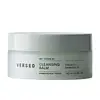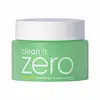What's inside
What's inside
 Key Ingredients
Key Ingredients

 Benefits
Benefits

 Concerns
Concerns

 Ingredients Side-by-side
Ingredients Side-by-side

Ethylhexyl Palmitate
EmollientCaprylic/Capric Triglyceride
MaskingCoco-Caprylate/Caprate
EmollientPolyglyceryl-6 Dicaprate
EmulsifyingSynthetic Wax
AbrasiveTocopherol
AntioxidantTocopheryl Acetate
AntioxidantEucalyptus Globulus Leaf Oil
PerfumingPersea Gratissima Oil
Skin ConditioningEugenia Caryophyllus Leaf Oil
MaskingSimmondsia Chinensis Seed Oil
EmollientPrunus Armeniaca Kernel Oil
MaskingSesamum Indicum Seed Oil
EmollientSclerocarya Birrea Seed Oil
HumectantCaprylyl Glycol
EmollientEugenol
PerfumingLimonene
PerfumingEthylhexyl Palmitate, Caprylic/Capric Triglyceride, Coco-Caprylate/Caprate, Polyglyceryl-6 Dicaprate, Synthetic Wax, Tocopherol, Tocopheryl Acetate, Eucalyptus Globulus Leaf Oil, Persea Gratissima Oil, Eugenia Caryophyllus Leaf Oil, Simmondsia Chinensis Seed Oil, Prunus Armeniaca Kernel Oil, Sesamum Indicum Seed Oil, Sclerocarya Birrea Seed Oil, Caprylyl Glycol, Eugenol, Limonene
Ethylhexyl Palmitate
EmollientCetyl Ethylhexanoate
EmollientPEG-20 Glyceryl Triisostearate
EmollientPEG-10 Isostearate
EmulsifyingSynthetic Wax
AbrasiveSimmondsia Chinensis Seed Oil
Emollient1,2-Hexanediol
Skin ConditioningC12-13 Alkyl Lactate
EmollientButylene Glycol
HumectantWater
Skin ConditioningCapryloyl Salicylic Acid
ExfoliatingSalicylic Acid
MaskingMelaleuca Alternifolia Leaf Extract
PerfumingMelaleuca Alternifolia Leaf Oil
AntioxidantMelia Azadirachta Leaf Extract
Skin ConditioningMelia Azadirachta Flower Extract
Skin ConditioningBambusa Vulgaris Extract
Skin ConditioningAspalathus Linearis Extract
Skin ConditioningAngelica Archangelica Root Extract
MaskingMalpighia Emarginata Fruit Extract
Skin ConditioningEthylhexyl Palmitate, Cetyl Ethylhexanoate, PEG-20 Glyceryl Triisostearate, PEG-10 Isostearate, Synthetic Wax, Simmondsia Chinensis Seed Oil, 1,2-Hexanediol, C12-13 Alkyl Lactate, Butylene Glycol, Water, Capryloyl Salicylic Acid, Salicylic Acid, Melaleuca Alternifolia Leaf Extract, Melaleuca Alternifolia Leaf Oil, Melia Azadirachta Leaf Extract, Melia Azadirachta Flower Extract, Bambusa Vulgaris Extract, Aspalathus Linearis Extract, Angelica Archangelica Root Extract, Malpighia Emarginata Fruit Extract
 Reviews
Reviews

Ingredients Explained
These ingredients are found in both products.
Ingredients higher up in an ingredient list are typically present in a larger amount.
Ethylhexyl Palmitate, also known as octyl palmitate, is created from 2-ethylhexyl alcohol and palmitic acid. It is a fatty acid ester.
The fatty acid content of Ethylhexyl Palmitate makes it an emollient. Emollients help soften and hydrate your skin by trapping moisture within.
Ethylhexyl Palmitate is also used to help improve the texture of cosmetics. It helps other ingredient dissolve in products and help disperse ingredients more evenly.
You'll likely find this ingredient in sunscreen, as it is often used to mix UV-blocking ingredients such as avobenzone and ethylhexyl triazone.
It can also help stabilize the fragrances in a product as a fragrance fixative.
Ethylhexyl Palmitate can be used to substitute mineral oil.
Due to its high fatty acid content, it may not be fungal-acne safe.
Learn more about Ethylhexyl PalmitateThis oil comes from the seeds of the desert shrub called Jojoba. It is more commonly known as jojoba oil, a non-comedogenic oil.
Jojoba oil does not contain fragrance and has many fatty-acids, making it a great soothing ingredient.
It also contains Vitamin E, a great moisturizing ingredient. Vitamin E is also an antioxidant and protects your skin against oxidative damage.
This ingredient humectant properties, meaning it helps draw moisture from the air. This helps keep your skin hydrated.
While jojoba has antibacterial properties, it is only able to kill some strains of bacteria.
Studies also show it helps in wound healing. In fact, Indigenous cultures have used jojoba as a moisturizer and to help treat burns for centuries.
Fun fact: Jojoba oil similar to natural human skin sebum, so it has a great effect on dry skin. It is also promising with helping to regulate sebum production.
Due to its fatty acid content, Jojoba oil may not be fungal acne safe. We recommend speaking with a professional if you have any concerns.
Learn more about Simmondsia Chinensis Seed OilSynthetic Wax is created from fossil fuels such as natural gas. It is used to enhance texture, adjust pH, and as an occlusive.
It may also be used as an abrasive ingredient to exfoliate the skin.
Synthetic Wax may not be fungal acne safe.
Learn more about Synthetic Wax